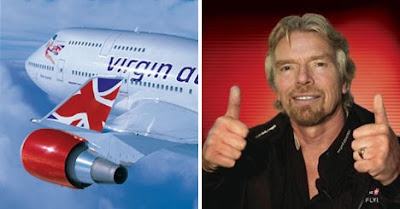 According to Fox news, Virgin Atlantic carried out the world's first flight of a commercial aircraft powered with biofuel on Sunday in an effort to show it can produce less carbon dioxide than normal jet fuels.
According to Fox news, Virgin Atlantic carried out the world's first flight of a commercial aircraft powered with biofuel on Sunday in an effort to show it can produce less carbon dioxide than normal jet fuels."This breakthrough will help Virgin Atlantic to fly its planes using clean fuel sooner than expected," Sir Richard Branson, the airline's president, said before the Boeing 747 flew from London's Heathrow Airport to Amsterdam's Schiphol Airport.
He said the flight would provide "crucial knowledge that we can use to dramatically reduce our carbon footprint," he said.
Sunday's flight was partially fueled with a biofuel mixture of coconut and babassu oil in one of its four main fuel tanks. The jet carried pilots and several technicians, but no passengers. It was not a 100% bio fuel flight, they just piped some of it into one engine, but it is a GOOD start.
Virgin Atlantic spokesman Paul Charles predicted this biofuel would produce much less CO2 than regular jet fuel, but said it will take weeks to analyze the data from Sunday's flight.
The flight is the latest example of how the world's airlines are jumping on the environmental bandwagon by trying to find ways of reducing aviation's carbon footprint. Air New Zealand and Rolls Royce (airplane engines) has something on the go to be tested soon.
These efforts have included finding alternative jet fuels, developing engines that burn existing fuels more slowly, and changing the way planes land.
The experiment by Virgin Atlantic and its partners -- Boeing, General Electric and Imperium Renewables -- also comes at a time when high oil prices and the U.S. economic slowdown are promoting consolidation in the airline industry.
Charles said Virgin's Boeing 747-400 jet and its engines did not have to be redesigned to use biofuel on the test flight.
He said CO2 emissions on a normal flight are generally three times the fuel burned, and that technical engineers on the test flight would take readings and analyze data to estimate its greenhouse gas emissions.
This could be a great change in emissions from airplanes. Thing is that bio fuel tends to burn more rapidly which results in a reduced range. I will be very interested to see the results of this test when they are available.
Good on you Virgin and Sir Richard...
No comments:
Post a Comment